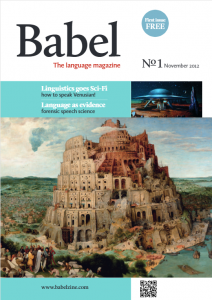Babel – the magazine for lovers of languages and linguistics
Babel is the quarterly language magazine that brings you cutting-edge linguistic research in an accessible and colourful format. Our print and digital issues cover a vast array of language lovers’ lore, taking in languages from around the world; the past, present and future of language, and the many different uses of linguistics in the world around us.
Our Best Of issue is available for free, with features taken from across our first 32 issues. You can read it online by clicking the link below, or get in touch at babelthelanguagemagazine@
Our sampler issue and Babel No1 are also free to read.

“Can’t recommend Babel highly enough.
If you love language you’ll be blown away – for pros and all language enthusiasts“
What’s in Babel?
Each 52-page issue of Babel contains unique articles on linguistic issues. Get a taster of some of our most popular articles below:
Each issue also contains regular features. Babel staples include our Linguistic lexicon A-Z of important linguistic terminology, Languages of the world introductions to everything from Maltese to Northern Sotho, and Ask a linguist, in which an agony linguist answers your questions on everything from why we use ‘X’ for a kiss to noun capitalisation in German!
You can find a full guide to what’s in Babel in our Issue guide.
Watch! The Babel Lecture 2022 with Stephen Fry.
Babel was honoured to have actor, writer and polymath Stephen Fry give our 10th anniversary Babel Lecture: ‘What we have here is a failure to communicate’. Stephen discussed the roots of his love of language, taking in his precocious quoting of Oscar Wilde, the pointlessness of pedantry, and the importance of enjoying your own gift for language.


The Babel Lexicon of Language
Babel is delighted to announce that the first Babel book is now available!
The Babel Lexicon of Language is an entertaining and accessible introduction to the key terminology involved in the study of language.
Ever wondered what the word is that describes the process of making supportive noises when you’re listening to someone, or how syntax differs from grammar?
All the answers are in our Lexicon.
Find out more about The Babel Lexicon of Language at Cambridge University Press.
Babel is available in print, digital and print + digital formats – subscribe now!
You can also keep up-to-date with all the latest Babel news – including our annual Babel Lecture and Young Writers’ Competition – by following us on Facebook and Twitter.
If you have any queries about Babel, please get in touch at babelthelanguagemagazine@


